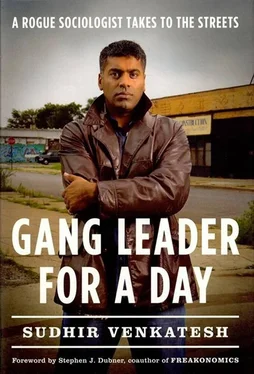Charlie was a retired factory worker, a beefy man with tattooed, well-developed arms, a college football star from long ago. Charlie sometimes came to Hyde Park for breakfast or lunch at one of the diners where other blacks hung out, but he never stayed past sun-down and he never walked on residential streets, he said, since the police would follow him.
“What about blacks?” I asked.
“You got blacks who are beating their heads trying to figure out a way to live where you live!” Charlie continued. “Don’t ask me why. And then you got a whole lot of black folk who realize it ain’t no use. Like us. We just spend our time trying to get by, and we live around here, where it ain’t so pretty, but at least you won’t get your ass beat. At least not by the police.”
“That’s how it’s been since black folk came to the city,” Old Time said, “and it’s not going to change.”
“You mean you don’t have any white friends?” I asked.
“You have any black friends?” Old Time countered with a sly grin. I didn’t need to answer. “And you may want to ask your professors if they have any,” he said, clearly pleased with his rebuke.
From these conversations I started to gain a bit of perspective on what it was like to be black in Chicago. The overriding sentiment was that given how the city operated, there was little chance for any significant social progress.
This kind of fatalism was foreign to me. When you grew up in affluent Southern California, even for someone as politically disengaged as I, there was a core faith in the workings of American institutions and a sustaining belief that people can find a way to resolve their differences, even racial ones. I was now beginning to see the limits of my narrow experience. Nearly every conversation with Old Time and his friends wound up at the intersection of politics and race. I couldn’t follow all the nuances of their arguments, especially when it came to local politics, but even I could see the huge gap between how they perceived the world and how sociologists presented the life of urban poor people.
One day I asked Old Time and his friends if they’d be willing to let me interview them for Professor Wilson’s survey. They agreed, and I tried for a few days. But I felt I wasn’t getting anywhere. Most of the conversations ended up meandering along, a string of interruptions and half-finished thoughts.
Charlie could see I was dejected. “Before you give up,” he said, “you should probably speak to the people who you really want to talk to-young men, not us. That’s the only way you’re going to get what you need.”
So I set out looking for young black men. At the U of C library, I checked the census records to find a tract with poor black families with people between the ages of sixteen and twenty-four. The Lake Park projects looked good, at least on paper, and I randomly chose Building Number 4040, highlighting on my census printout the apartments where young people lived. Those were the doors I’d be knocking on. Old Time told me that I could go any day I wanted. “Most black folk in the projects don’t work,” he said, “so they don’t have nowhere else to be.” Still, I thought a weekend would be the best time to find a lot of people.
On a brisk Saturday afternoon in November, I went looking for 4040 South Lake Park, one of several high-rise projects in Oakland, a lakefront neighborhood about two miles north of the U of C. Oakland was one of the poorest communities in Chicago, with commensurately high rates of unemployment, welfare, and crime. Its population was overwhelmingly black, dating back to the early-twentieth-century southern migration. The neighborhood surrounding the Lake Park projects wasn’t much of a neighborhood at all. There were few people on the streets, and on some blocks there were more vacant lots than buildings. Aside from a few liquor stores and broken-down bodegas, there wasn’t much commerce. It struck me that most housing projects, even though they are built in cities, run counter to the very notion of urban living. Cities are attractive because of their balkanized variety: wandering the streets of a good city, you can see all sorts of highs and lows, commerce and recreation, a multitude of ethnicities and just as many expressions of public life. But housing projects, at least from the outside, seemed to be a study in joyless monotony, the buildings clustered tightly together but set apart from the rest of the city, as if they were toxic.
Up close, the buildings looked like tall checkerboards, their dull yellow-brick walls lined with rows of dreary windows. A few of the windows revealed the aftermath of an apartment fire, black smudges spreading upward in the shape of tombstones. Most of the buildings had only one entrance, and it was usually clogged with young people.
By now I was used to being observed carefully when I walked around a black neighborhood. Today was no different. As I approached one of the Lake Park projects, five or six young men stared me down. It should be said here that I probably deserved to be stared at. I was just a few months removed from a long stretch of time I’d spent following the Grateful Dead, and I was still under the spell of Jerry Garcia and his band of merrymakers. With my ponytail and tie-dyed shirt, I must have looked pretty out of place. I tended to speak in spiritually laden language, mostly about the power of road trips; the other grad students in my department saw me as a bit naïve and more than a little loopy. Looking back, I can’t say they were wrong.
But I wasn’t so naïve that I couldn’t recognize what was going on in the lobby of the building that I now approached. Customers were arriving, black and white, by car and on foot, hurrying inside to buy their drugs and then hurrying back out. I wasn’t sure if this building was Number 4040, and I couldn’t find the number anywhere, so I just walked inside. The entryway smelled of alcohol, soot, and urine. Young men stood and crouched on plastic milk crates, a couple of them stomping their feet against the cold. I put my head down, took a breath, and walked past them quickly.
Their eyes felt heavy on me as I passed by. One huge young man, six foot six at least, chose not to move an inch as I passed. I brushed up against him and nearly lost my balance.
There was a long row of beaten-up metal mailboxes, many of them missing their doors. Water was dripping everywhere, puddling on the ground. Shouts and shrieks cascaded down from the higher floors, making the whole building feel like some kind of vibrating catacomb.
Once I got past the entryway, it was darker. I could make out the elevator, but I seemed to be losing any peripheral vision, and I couldn’t find the button. I sensed that I was still being watched and that I ought to press the button fast, but I groped around in vain. Then I started looking for the stairwell, but I couldn’t find that either. To my left was a large barrier of some kind, but I was too nervous to go around it. To my right was a corridor. I decided to go that way, figuring I’d come across a stairwell or at least a door to knock on. As I turned, a hand grabbed my shoulder.
“What’s up, my man, you got some business in here?” He was in his twenties, about as tall and dark as I was. His voice was deep and forceful but matter-of-fact, as if he asked the same question regularly. He wore baggy jeans, a loose-fitting jacket, and a baseball cap. His earrings sparkled, as did the gold on his front teeth. A few other young men, dressed the same, stood behind him.
I told them that I was there to interview families.
“No one lives here,” he said.
“I’m doing a study for the university,” I said, “and I have to go to Apartments 610 and 703.”
“Ain’t nobody lived in those apartments for the longest,” he said.
Читать дальше












